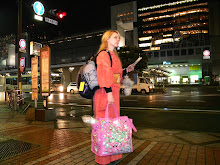
A young boy sells us small wreaths woven from orange and yellow marigolds, in the center of which burn white candles. We are to set these fiery marigolds upon the water. They are for saying prayers or securing family health or wealth or whatever might encourage us to part with a few rupees and buy a candle. I whisper a wish into mine and watch as it drifts away.

The candles make tiny pinpricks of light as they float atop the still dark water. There are dozens of them bobbing on the Ganges this morning. I like our young boatman because, whether by luck or design, his oars never knock into any of them.
The sun rises over Mother Ganga. It is like every other sunrise, unique onto the day.

Even the water is quiet, its stillness disturbed only by passage of the small boats upon it.

Varanasi is beautiful this time of day, seems to glow from within as the sun casts its light upon it. A light turquoise sky, with a ruffle of foamy white clouds, appears.

We witness the city as it slowly awakens. Women are washing laundry in the river, beating cloths against the rocks and then spreading them across the steep steps of the ghats to dry. A bright rainbow of wet sarees gleam in the sunlight. Elsewhere, a girl dunks under the water and bubbles back up. A younger boy, her brother perhaps, splashes her and then flops full body into the water himself. Opposite the city bank of the Ganges, fishing men stand in their skiffs, bending and gathering their nets from the river. Moving slowly among these scenes is like opening up the pages of a National Geographic and stepping inside.

Katie and I take our photos in front of an old, reddish palace on the Ganges. It is dilapidated and beautiful.
"The king of Varanasi used to live there," our boat rower tells us.


The ghat in this area, with the large pink pillars, is where special ceremonies are held the first two nights after our arrival in Varanasi. One night we walk there, to a stage with five raised platforms. At the center of each platform is a man wearing maroon and dark gold clothing. All the men repeat the same motions synchronistically, ringing bells as they swing them in a circular motion above their heads, taking large silver holders that gleam with candle flame and waving them in a slow circular motion as well, and -- most lovely -- taking handfuls of marigold petals and scattering them so that the air briefly seems to be raining golden petals. All the while, people chant and pull on strings that jiggle a line of bells strung high above the edge of the Ganges.

But also, people are dying. Varanasi is where the old and infirm gather before death. The Ganges' water is considered holy, and bathing in the waters here is the best way to prepare the soul. All the people who come anticipating death live -- until that time -- in group homes that correspond with their cities of birth.
We pass by the burning ghats in our boat. It is the largest of several cremation sites along the Ganges. I take no photos of this, but we do leave the boat and walk through the area while keeping a respectful distance. The dead are wrapped in white cloth and decorated with marigolds. The bodies are then carried through the city, above men's heads, and taken into the river, where they are dunked three times for purifying. Next, the bodies are laid on bonfires and burned as their families watch. This can take many hours.
The timber used for burning is giant black logs that are piled in nearly every corner of these particular ghats. Nearby, crackles the fire used to start all the fires. It is called the eternal flame. This must not extinguished for as long as the world exists. Heavy coils of grey smoke rise from the burning log piles and float into the sky. The air smells like burning flesh. Two puppies, romping in an endearingly clumsy manner, catch my attention. They seem to be tussling over something. If it's a bone, it's best not to consider the source.
The Indians we speak to don't view these deaths as sad. The people who died there have spent their final moments in India's oldest and holiest city. It is a triumph, a time to quietly rejoice.

We return to the Ganpati and take our breakfast: warm chocolate and cocoanut pancakes. We eat them at a little table on the rooftop overlooking the Ganges. I order tea made of freshly crushed mint leaves, to which I add several scoops of coarse-grained sugar. I lean over the edge of the rooftop, look back at the river and burning ghats from which we've just returned. I have never felt so alive.



I want another chocolate pancake. Right now.
ReplyDeleteI want some more fresh mint tea soooo much.
ReplyDelete